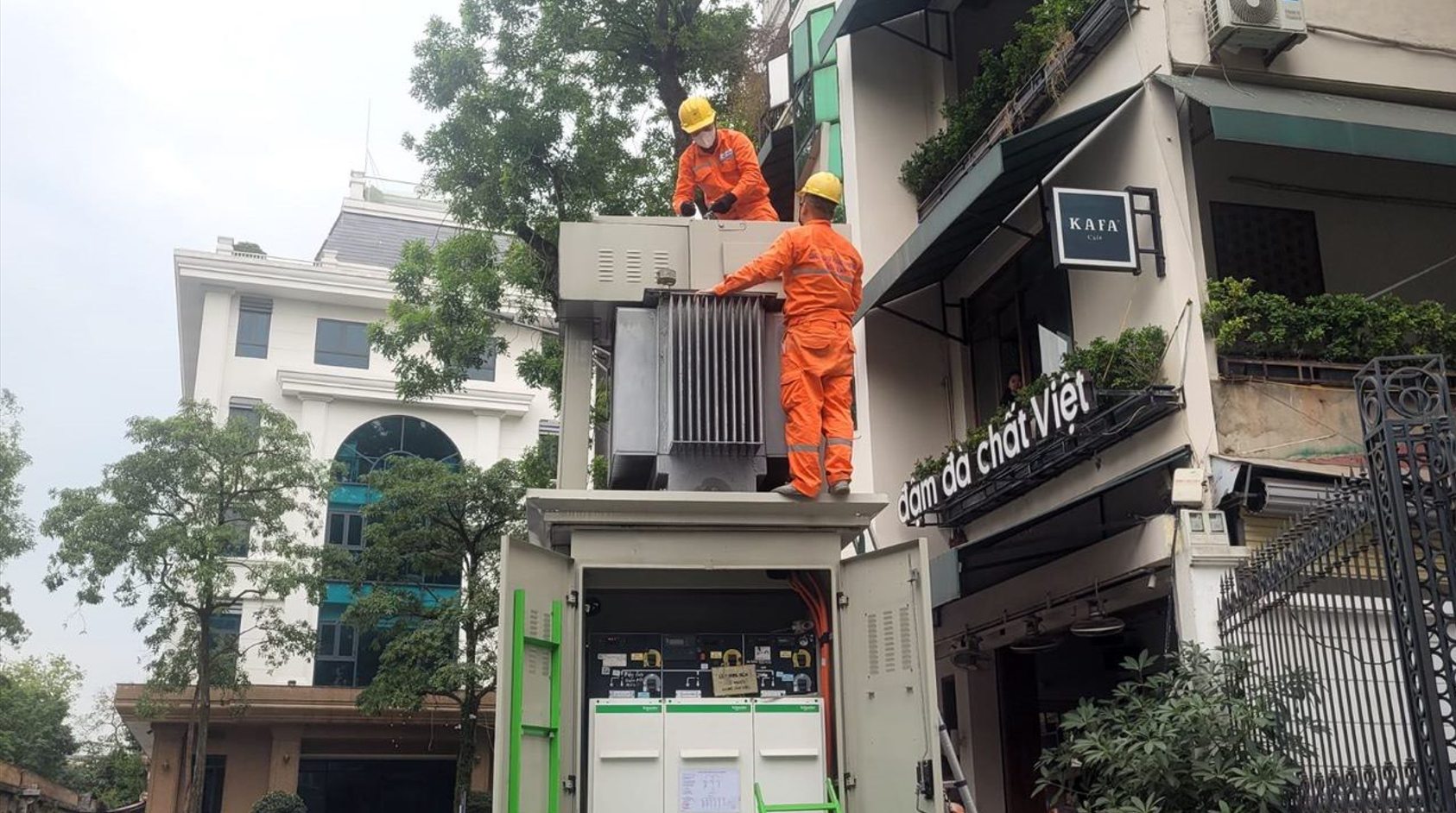Reporter: The amended Power Law, which will take effect on February 1, 2025, introduces new provisions on electricity pricing. Can you elaborate on these changes, Mr. Hòa?
– Mr. Trần Việt Hòa, Director of the Electricity Regulatory Authority of Vietnam – Ministry of Industry and Trade: The electricity pricing policy in the amended Power Law has institutionalized Resolution No. 55-NQ/TW of 2020 issued by the Politburo on the orientation of the energy development strategy of Vietnam by 2030, with a vision to 2045. It also legalizes the regulation of electricity prices by converting the provisions on the mechanism for adjusting the average electricity selling price from a “Decision of the Prime Minister”, as stipulated in the current Power Law, to a “Decree of the Government”.

The amended Power Law stipulates that retail electricity prices should be adjusted promptly to reflect the actual fluctuations in input parameters, covering reasonable and legitimate costs, along with a reasonable profit margin to preserve and develop the business capital of enterprises. These adjustments should also align with the socio-economic conditions of each period and the level of competition in the electricity market. The Government is entrusted with the task of issuing detailed guidelines to ensure flexibility in implementation.
By entrusting the Government with this responsibility, the amended Law strikes a balance between closely following market fluctuations and maintaining consistency in macroeconomic management (as electricity prices are a crucial macroeconomic factor) while also considering other socio-economic balances.
Furthermore, the Government’s Decree will provide more specific regulations on certain aspects, such as reasonable profit margins and the timeline for electricity price adjustments, thereby establishing a solid legal foundation for practical implementation.
Many people have long been concerned about electricity prices only increasing without any decreases. With the new pricing mechanism under the amended Power Law, can electricity prices be reduced?
– The current Power Law stipulates that electricity prices should be determined based on a market mechanism with state regulation, aligning with the level of development of the power industry and the mechanism for adjusting the average electricity selling price, as detailed in Decision No. 05/2024/QD-TTg issued by the Prime Minister (replacing Decision No. 24/2017/QD-TTg).
Electricity price adjustments are considered based on objective fluctuations in input parameters across the production and supply chain of electricity, other costs not yet included in electricity prices, and profits on owner’s equity directly serving the production and supply of electricity by the Vietnam Electricity Group (EVN).

Hanoi Electricity Corporation staff performing maintenance and repair work on the electricity system. Photo: LÊ THÚY
Accordingly, when the average electricity selling price decreases by 1% or more or increases by less than 5% compared to the current price, EVN is authorized to make the necessary adjustments. If the increase ranges from 5% to under 10%, EVN can adjust the price after obtaining the opinion of the Ministry of Industry and Trade. For increases of 10% or more or those that significantly impact the macroeconomy, the Ministry of Industry and Trade reports to the Prime Minister for consideration and guidance.
The new provisions in the amended Power Law stipulate that retail electricity prices should be adjusted promptly to reflect the actual fluctuations in input parameters. Can you elaborate on how this affirms the orientation of gradually aligning electricity price management with market dynamics?
Thus, according to the current regulations, electricity prices can either increase or decrease, depending on the fluctuations in input parameters. However, electricity price management is just one link in the Government and Prime Minister’s overall macroeconomic management chain. Therefore, at certain times, to ensure macroeconomic stability and other balances, the Prime Minister has directed the stabilization of electricity prices, resulting in electricity prices not fully reflecting the fluctuations in costs (with a tendency to increase compared to the previous period).
The new provisions in the amended Power Law affirm the orientation of gradually aligning electricity price management with market dynamics by stipulating that retail electricity prices should be adjusted promptly to reflect the actual fluctuations in input parameters.
In the future, the Government will issue a decree to replace Decision No. 05/2024/QD-TTg on the mechanism for adjusting the average electricity selling price to enhance the practicality of electricity price management. Consequently, fluctuations in input parameters, such as fuel prices, electricity output structure, and foreign exchange rates, will influence the increase or decrease of the average electricity selling price.
Mr. Hòa, to regulate electricity prices based on market mechanisms, it is necessary to accelerate the development of a competitive retail electricity market. What are your thoughts on this?
– Building and developing a competitive electricity market, including a competitive retail electricity market, is one of the Party and Government’s critical policies.
According to Decision No. 63/2013/QD-TTg, once the necessary conditions are met, Vietnam has been gradually implementing the competitive electricity market at different levels. Currently, we are in the stage of a competitive wholesale electricity market. Transitioning to a competitive retail electricity market is a complex process that requires thorough preparation in various aspects and the fulfillment of essential prerequisites.
Although the competitive electricity generation and wholesale market has been operating for more than 12 years, the level of competition remains limited. To progress to the competitive retail electricity market stage, it is essential to address core and critical issues, including restructuring the electricity industry, reforming retail electricity prices (eliminating cross-subsidization), separating the distribution and retail functions, and developing the necessary infrastructure to support market operations.
With the recently passed amended Power Law and in the context of Vietnam potentially facing an imbalance between electricity supply and demand in the coming years, the roadmap for developing a competitive electricity market, including a competitive retail electricity market, needs to be reviewed and adjusted accordingly to ensure feasibility and effectiveness.
One of the steps toward a competitive retail electricity market was the Government’s issuance of Decree 80 on the mechanism for direct power purchase agreements (DPPA) between renewable energy generators and large electricity consumers. However, in reality, many customers are still unable to purchase electricity directly. Can you explain this situation?
– Allowing large electricity consumers to enter into direct power purchase agreements with renewable energy generators is a novel and significant initiative in Vietnam.
The DPPA mechanism has garnered significant interest and has been eagerly anticipated by many organizations and individuals. However, its implementation still faces several challenges, including the need for adaptation to its novelty, the complexity of agreements and contracts, and the management of costs, supply, and financial capabilities.
The Electricity Regulatory Authority of Vietnam has advised the Ministry of Industry and Trade to provide strong guidance to EVN, the National Load Dispatch Center, and Electricity and Renewable Energy Authority (EREA) to promptly finalize and announce related matters. These include participation costs in the DPPA (for the use of the electricity system and settlement of differences), amendments and issuance of business processes and internal regulations, and the development of a management process for registration, confirmation, data reconciliation, and calculation of payments for electricity volumes traded under the mechanism…
The Ministry of Industry and Trade will continue to review, refine, and promptly submit to the competent authorities for issuance of other necessary regulations to enhance the efficiency of DPPA participation. The successful implementation of this mechanism requires close coordination between government agencies, businesses, and the public.
Review and propose adjustments to Power Development Plan VIII
According to Mr. Trần Việt Hòa, the demand for green and clean electricity through the DPPA mechanism is increasing. However, the current supply cannot meet this demand as the scale of rooftop solar power has reached the limit of 2,600 MW set by Power Development Plan VIII for the self-consumption rooftop solar power model. Meanwhile, large-scale renewable energy projects require time to develop.
In the past, the Ministry of Industry and Trade has directed its units to review, evaluate, and propose adjustments to Power Development Plan VIII. These adjustments aim to promptly supplement the development goals for renewable energy, especially rooftop solar power, to increase the potential for participation in the DPPA mechanism, particularly the model with a dedicated connection line.















